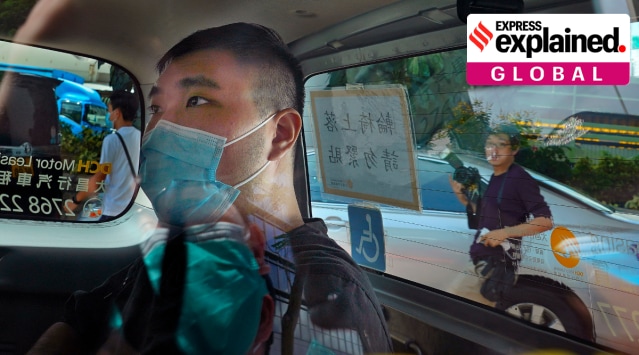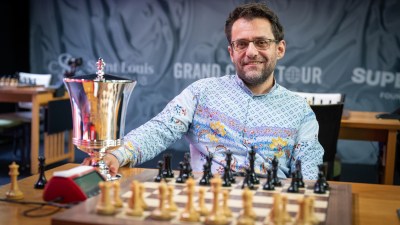Explained: The first case under Hong Kong’s National Security Law
Ying-kit Tong has been found guilty under Hong Kong’s sweeping national security law. What is the law, and what was the case against the 24-year-old?
 Tong Ying-kit in a police van in Hong Kong. (AP Photo/File)
Tong Ying-kit in a police van in Hong Kong. (AP Photo/File)Over a year after China passed its Hong Kong National security law saying it would only affect “extreme criminals”, a 24-year-old former waiter, the first person to undergo trial under the law, was found guilty on Tuesday (July 27). Ying-kit Tong’s trial began on June 23 this year.
What is the case against Ying-kit Tong?
After the law was passed last year, thousands had taken to the streets in protest. The police cracked down on the protesters, arresting Tong Ying-kit less than 24 hours after the law was passed.
Tong was held for driving his motorcycle into three riot police officers, for which he was found guilty of terrorism. The 24-year-old was also found guilty of inciting secessionism for carrying a flag with the slogan “Liberate Hong Kong, revolution of our times” written on it.
#BREAKING: Tong Ying-kit is found guilty of terrorism and inciting secession, becoming the first person convicted under Hong Kong’s national security law.
Last year, he drove a motorcycle with the slogan “Liberate Hong Kong, Revolution of Our Times” into police. Photo: i-Cable. pic.twitter.com/bD0nlP1GZR
— Holmes Chan (@holmeschan_) July 27, 2021
According to Citizen News, an independent Hong Kong news organisation, the three judges hearing Tong’s case said, “the defendant displayed the slogan at that time with the intention of splitting the country.”
Tong’s trial was heard by a three-judge bench — Esther Toh, Anthea Pang and Wilson Chan — instead of a jury. The three judges stated that Tong’s understanding of the slogan “attracted the attention of the public” and “aimed to separate the country”, Citizen news reported.
The three judges were chosen by the Chief Executive of Hong Kong and Chairperson of the Committee for Safeguarding National Security, Carrie Lam.
Many activists and protestors claim that the case was against Hong Kong’s common law traditions, since Tong was denied bail and, for the first time in 176 years, a jury trial.
The right to a jury is a very significant feature of Hong Kong’s legal system. It is a common law tradition, which was initially designed to protect people from the possibility of authorities misusing their powers.
As tweeted by Citizen News, the court said that Tong’s intention was to intimidate the public by “trying to contain or suppress the voice of opposition”, and even described that “intimidating some people in society is equivalent to intimidating the whole society”.
The court also added that the word “revolution”, in the quote carried by Tong in the protests, can be interpreted as overthrowing the government.
Taking the example of intention to incitement to murder, the court ruled that proving that there is an intention to incite for murder is enough to be proved guilty and there is no need to prove that substantive actions, like poisoning or stabbing, had been taken.
Newsletter | Click to get the day’s best explainers in your inbox
How has the world responded to the trial?
Yamini Mishra, Asia-Pacific Regional Director of Amnesty International, in a statement, said, “The conviction of Tong Ying-kit is a significant and ominous moment for human rights in Hong Kong. Today’s verdict underlines the sobering fact that expressing certain political opinions in the city is now officially a crime, potentially punishable by life in jail.”
The conviction of Tong Ying-kit is a significant and ominous moment for human rights in Hong Kong.
People should be free to use political slogans during protests, and Tong Ying-kit should not be punished for exercising his right to free speech. https://t.co/1iShISi5lb
— Amnesty International (@amnesty) July 27, 2021
Mishra added that charging Tong with secession over a widely used slogan was “a violation of international law, under which expression must not be criminalized unless it poses a concrete threat”.
Finn Lau, a Hong Kong activist in exile, tweeted, “There is only rule by law, instead of rule of law in #HongKong. Trial without jury & sentencing Tong Ying-kit into jail indicate how fragile China’s national security is.”
There is only rule by law, instead of rule of law, in #HongKong.
Trail without jury & sentencing Tong Ying-kit into jail indicate how fragile China’s national security is.
This case would be one of the catalysts to another uprising in the city. Time will tell. pic.twitter.com/81jIaYdRs6
— Finn Lau 劉祖廸 (@finnlau_cd) July 27, 2021
Lau claimed that the case would be “one of the catalysts to another uprising” in Hong Kong.
Benedict Rogers, Chief Executive of Hong Kong Watch, a human rights organisation, condemned the trial and called it heartbreaking. In a statement, Rogers said that the verdict “sets a grim precedent that will open the path to further arrests, prosecutions, and political trials”.
A pro-democracy Hong Kong activist Nathan Law called the trial, “a political show trial”, where the right to a jury was denied and the government handpicked the judges.
What are other arrests under the law?
According to The Guardian, “At least 128 people have been arrested under the NSL or by its dedicated police department, including three minors, dozens of politicians, and journalists. More than half have been charged with national security offences that carry up to life in prison, and only 17 were granted bail.”
3/ Despite claims from #HongKong officials that the impact National Security Law would be small, it has become a direct threat to journalism, leading to raids on newsrooms, arrests of editors, and the closure of prominent pro-democracy tabloid Apple Dailyhttps://t.co/DX3ZmMQlTj
— IPI – The Global Network for Press Freedom (@globalfreemedia) July 21, 2021
In one of the recent arrests, Hong Kong police arrested four people working in the Apple Daily Newspaper, a pro-democracy media organisation. Among those arrested was the newspaper’s former Executive Editor-in-chief Lam Man-chung. The police said that the arrests were made due to a suspicion of, “conspiring to collude with foreign countries or foreign forces to endanger national security”.
Hong Kong police had also arrested founder Jimmy Lai, in May, under the law for holding an unauthorised demonstration on Oct 1, 2019.
The newspaper ultimately shut after several raids on its headquarters and after its assets and accounts were frozen by the police.
On July 22, the Hong Kong police arrested five members, two men and three women, of the General Union of Hong Kong speech therapists under the law citing sedition in a children’s book about sheep, which explained the pro-democracy movement. According to the police, the arrested people “conspired to publish, distribute, exhibit or copy seditious publications”.
What is the National Security law?
The National Security Law was passed by China on June 30 last year before the 23rd anniversary of Hong Kong’s transfer from Britain.
It was titled ‘The Law of the People’s Republic of China on Safeguarding National Security in the Hong Kong Special Administrative Region’ and was unanimously passed by the Chinese government and immediately made a part of Hong Kong’s legal system, according to Global Times.
The law includes Secession, Subversion, Terrorist Activities, and Collusion with a Foreign Country or with External Elements to Endanger National Security as offences. Life imprisonment is the maximum punishment for all offences and can be followed by lesser penalties.
- 01
- 02
- 03
- 04
- 05






































